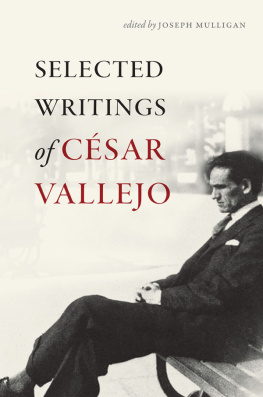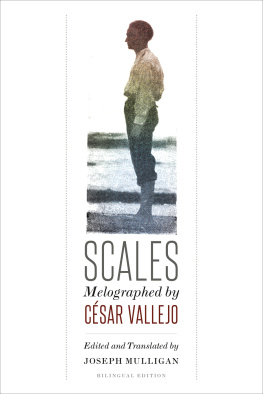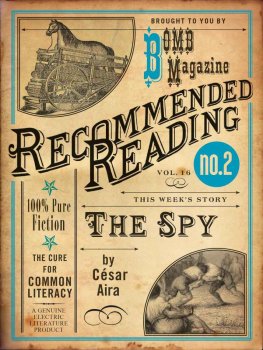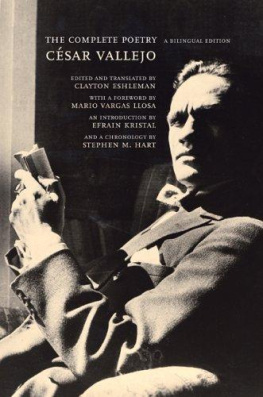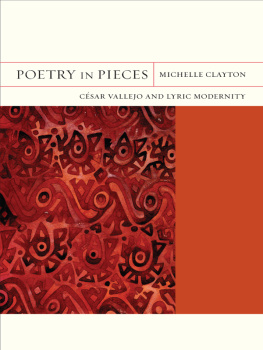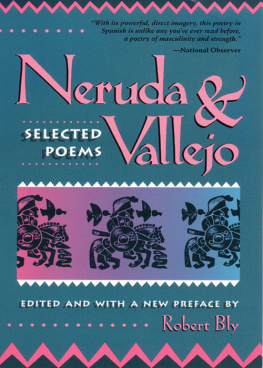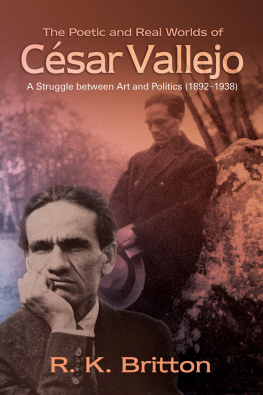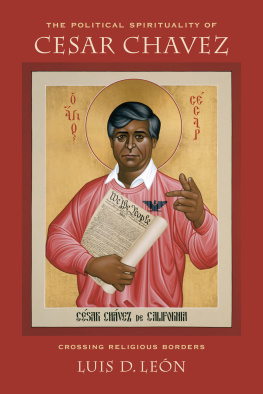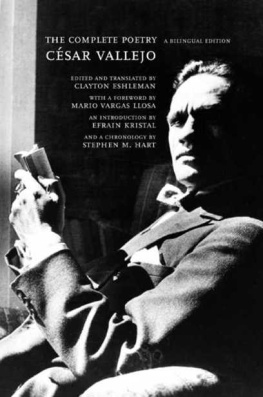
Selected Writings of CSAR VALLEJO
WESLEYAN POETRY
publication of this book is funded by the
BEATRICE FOX AUERBACH FOUNDATION FUND
at the Hartford Foundation for Public Giving
Selected Writings of
CSAR VALLEJO
Edited by JOSEPH MULLIGAN
WESLEYAN UNIVERSITY PRESS
Middletown, Connecticut
Wesleyan University Press
Middletown, CT 06459
www.wesleyan.edu/wespress
2015 Wesleyan University Press
All rights reserved
Manufactured in the United States of America
Designed by Richard Hendel
Typeset in Arnhem by Tseng Information Systems, Inc.
Wesleyan University Press is a member of the Green Press Initiative. The paper used in this book meets their minimum requirement for recycled paper.
Library of Congress Cataloging-in-Publication Data
Vallejo, Csar, 18921938.
[Works. Selections. English]
Selected writings of Csar Vallejo / edited [and translated]
by Joseph Mulligan.
pages cm.(Wesleyan poetry series)
Includes bibliographical references and index.
Summary: Selected Writings of Csar Vallejo has all the best writing of a major Spanish modernistprovided by publisher.
ISBN 978-0-8195-7484-8 (cloth: alk. paper)ISBN 978-0-8195-7525-8 (ebook)
1. Vallejo, Csar, 18921938Translations into English. I. Mulligan, Joseph W., 1981 editor, translator. II. Title.
PQ8497.V35A2 2015
861.62dc23 2014048342
5 4 3 2 1
publication of this book is funded by the
BEATRICE FOX AUERBACH FOUNDATION FUND
at the Hartford Foundation for Public Giving
Front cover: Csar Vallejo in Nice, 1929, by an unknown photographer. Image courtesy of Gladys Flores Heredia. (Original image from the archive of the National Library of Peru.)
CONTENTS
ACKNOWLEDGMENTS
The materialization of this book would never have been possible without the dedicated work of the contributing translators: Clayton Eshleman, Pierre Joris, Suzanne Jill Levine, Nicole Peyrafitte, Michael Lee Rattigan, William Rowe, Eliot Weinberger, and Jason Weiss. Without their good will and expertise, this publication of so many pages of previously untranslated texts and the compilation of preexisting translations would still exist only as an idea. My deep gratitude to them for sharing this vision and making it a reality.
Special thanks are due to Clayton Eshleman, who suggested I take on this project. He was its first supporter and provided crucial suggestions regarding the structure of the book. My thanks as well go to Pierre Joris, who, for the past ten years, has been my mentor and an invaluable guide in my search for an understanding of poetics and translation.
I am grateful to Suzanne Jill Levine, who was an adviser on this project and, in addition to translating, provided feedback on the structure of the book and helped facilitate a collaborative review of the selection by Jorge Luis Castillo, Michelle Clayton, Efran Kristal, Jos Antonio Mazzotti, Eliot Weinberger, and Jason Weiss, all of whom deserve my utmost thanks for their work toward developing a balanced range of writings.
I should also express my gratitude to Ernesto Livon Grossman, whose views on the Latin American experimental traditionin a conversation that has lasted over a decadehave profoundly shaped the way Ive come to frame Vallejos writings. My thanks are also due to James Sherry, who edited my translation Against Professional Secrets (Roof Books) and helped me see the trajectory of Vallejos previously untranslated prose.
A thousand thanks to Stephen Hart, who generously reviewed the biographical material of the introduction; Gustavo Favern Patriau, whom I consulted on several occasions about problems in interpretation; Cory Merril, who helped determine the transliteration of Vallejos Russian vocabulary; and Odi Gonzles, who analyzed and commented on Vallejos Quechua vocabulary, offering modern standard spellings.
Michael Lee Rattigan also deserves singular recognition for the magnitude of his contribution of previously untranslated magazine articles and letters and for his constant support and selfless dedication in our collaborative translation process. I must also thank poet and translator Mario Domnguez Parra, who, over the past three years, has weighed in extensively on some of the most intricate translation problems that arise in the texts presented here. His dedication to helping preserve the idiosyncrasy of Vallejos writing contributed in a major way to these translations and the notes that follow them. Finally, this volume would never have been possible without the support of my wife, Beatriz Sosa Matta, who has enthusiastically encouraged my work and shared in the discovery entailed by retracing Vallejos steps down his many winding roads.
Some of my translations have appeared in Literal Magazine, Jerome Rothenbergs Poems and Poetics, and Asymptote Magazine. Some early versions of Michael Lee Rattigans translations appeared in the Black Herald. Eliot Weinbergers contribution was first published in Sulfur. Clayton Eshlemans translations have been widely published over the past fifty years, in magazines, journals, and a trove of books. We are grateful to the University of California Press for allowing us to reprint his most recent versions in The Complete Poetry (2007).
INTRODUCTION
Csar Vallejo is by far the most well-known Peruvian writer, yet hes also the most obscure. Since his rise to fame in the mid-twentieth century, hundreds of books, essays, academic theses, and dissertations have been written on his poetry and literary persona. Numerous editions of his poems have appeared in the original Castilian and in translation, as comprehensive volumes and as anthologies.
More often than not, Vallejos readers in English translation sever the tree limb and, onto an already truncated representation, they graft a contrived avant-garde branch, which theyre convinced belongs there because theyve already seen it in his contemporaries. But can we blame these readers for this confusion, or must we, his translators, assume responsibility, since were the ones whove known enough to shudder at his poetrys intensity, but out of professional interest or genric prejudice have consciously or unconsciously ignored the rest of his oeuvre? Few times in the history of Western literature has the representation of such a multifaceted figure been so one-dimensional.
The following compendium reconfigures Csar Vallejos oeuvre. Its an opportunity to reformulate an understanding of the writings and persona of one of the most important literary figures of the twentieth century. In the following introduction, I sketch out Vallejos biography to show where and in whose company he was during specific historical moments and during the composition of certain texts, before moving on to characterize the works or collections of writings from which the selections have been drawn, with the aim of elucidating the oeuvre, specifying its publication history in relation to the authors writing process, and synthesizing predominant aesthetic features that let us better understand his ideas. Finally, by way of conclusion, I offer some brief remarks on the English translation work that lies ahead.
High in the Andes of northern Peru, where the cordillera rises ten thousand feet above sea level in a distance of about 350 miles, in the Department of La Libertad theres a place called Santiago de Chuco. On March 16, 1892, on Calle Coln 96 in that town, a forty-two-year-old mestiza named Mara de los Santos Mendoza Gurrionero (18501918), wife of Francisco de Paula Vallejo Bentez (18401924) and mother of eleven, gave birth to her twelfth and final child, whom she named Csar Abraham.
Next page
